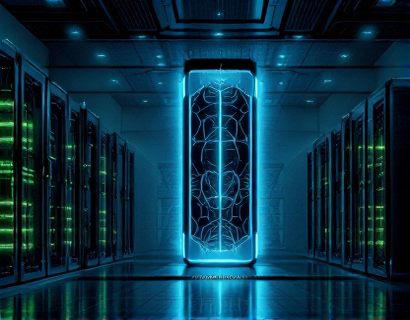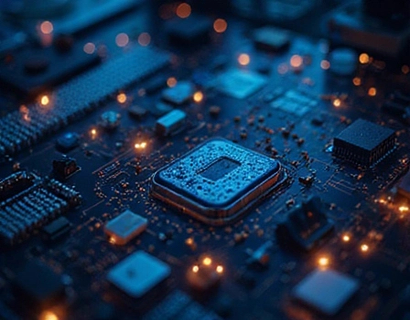Blockchain-Enhanced Registry Software: Revolutionizing Data Management
In the rapidly evolving landscape of data management, the integration of blockchain technology has emerged as a transformative force, offering unparalleled security, transparency, and efficiency. This article delves into the realm of blockchain-enhanced registry software, designed to revolutionize how professionals and enthusiasts approach data management. By leveraging the inherent properties of blockchain, such as decentralization, immutability, and cryptographic security, this innovative software addresses the critical challenges faced by traditional registry systems.
Understanding Blockchain Technology
Before exploring the applications of blockchain-enhanced registry software, it is essential to grasp the fundamentals of blockchain technology. At its core, a blockchain is a distributed ledger that records transactions across multiple computers in such a way that the registered transactions cannot be altered retroactively. This technology relies on a network of nodes, each maintaining a copy of the ledger, ensuring that no single entity has control over the entire system. The use of cryptographic hashes and consensus mechanisms further secures the data, making it highly resistant to tampering and fraud.
Key Features of Blockchain-Enhanced Registry Software
Blockchain-enhanced registry software integrates these core principles to provide a robust solution for managing various types of data. The key features of such software include:
- Decentralization: By distributing the data across a network of nodes, the software eliminates the need for a central authority, reducing the risk of single points of failure and enhancing resilience.
- Immutability: Once data is recorded on the blockchain, it cannot be altered or deleted without consensus from the network. This ensures the integrity and authenticity of the data, providing a tamper-proof record.
- Transparency: All transactions are visible to the network participants, promoting transparency and trust. This visibility allows for real-time tracking and verification of data, reducing the potential for errors and fraud.
- Security: The use of advanced cryptographic techniques ensures that data is securely stored and transmitted. Each transaction is encrypted and linked to the previous one, forming a secure chain of blocks.
- Efficiency: Automated smart contracts can streamline processes, reducing manual interventions and accelerating transaction times. This not only improves efficiency but also reduces operational costs.
Benefits for Professionals in Data Management
For professionals involved in data management, the adoption of blockchain-enhanced registry software brings numerous advantages. Firstly, the immutable nature of blockchain ensures that data remains consistent and reliable over time, eliminating the need for extensive audits and verification processes. This leads to increased efficiency and reduced administrative burdens.
Moreover, the transparency provided by blockchain technology fosters trust among stakeholders. Regulatory compliance becomes more straightforward as all transactions are recorded and accessible, ensuring that organizations meet the required standards. This is particularly crucial in industries such as finance, healthcare, and supply chain management, where data integrity and compliance are paramount.
Additionally, the decentralized nature of blockchain reduces the risk of data breaches and cyber attacks. Since there is no central repository of data, the attack surface is significantly minimized. This enhanced security is invaluable for professionals who handle sensitive information and are responsible for protecting it from unauthorized access.
Enhancing Registry Management Processes
Registry management involves the creation, maintenance, and updating of records. Traditional methods often suffer from inefficiencies, such as manual data entry, lack of real-time updates, and vulnerability to tampering. Blockchain-enhanced registry software addresses these issues by providing a seamless and secure platform for registry management.
One of the primary benefits is the automation of data entry and updates through smart contracts. These self-executing contracts with the terms directly written into code can trigger actions based on predefined conditions, reducing the need for manual intervention. For example, in property registry management, a smart contract can automatically update ownership records when a transfer is completed, ensuring that the registry is always up-to-date.
Furthermore, the distributed ledger technology ensures that all participants have access to the latest version of the data. This real-time synchronization eliminates the delays and discrepancies often associated with centralized systems. For instance, in intellectual property registries, creators can instantly verify the status of their applications and track the progress of their rights, streamlining the entire process.
Case Studies and Real-World Applications
To better understand the practical implications of blockchain-enhanced registry software, let's explore some real-world applications across different sectors.
Supply Chain Management
In supply chain management, blockchain-enhanced registry software can track the movement of goods from origin to destination. Each step in the supply chain, from manufacturing to delivery, is recorded on the blockchain, providing a transparent and immutable record. This not only enhances traceability but also helps in quickly identifying and addressing issues such as recalls or quality concerns. Companies like IBM and Walmart have already implemented blockchain solutions to improve the transparency and efficiency of their supply chains.
Healthcare Records
In the healthcare sector, patient records are critical for providing quality care. Blockchain-enhanced registry software can securely store and manage medical records, ensuring that they are accessible to authorized personnel while maintaining patient privacy. The immutable nature of the blockchain ensures that records cannot be altered without detection, reducing the risk of fraud and errors. This can lead to better patient outcomes and more efficient healthcare delivery.
Land Registry
Land registry is another area where blockchain can make a significant impact. Traditional land registry systems are often plagued by issues such as fraud, corruption, and inefficiency. By using blockchain, land ownership records can be securely and transparently managed, reducing the risk of disputes and ensuring that property rights are accurately recorded. Countries like Estonia have already started exploring blockchain-based land registry systems to enhance governance and reduce administrative costs.
Challenges and Considerations
While the benefits of blockchain-enhanced registry software are clear, there are also challenges and considerations that organizations must address when implementing such solutions.
Firstly, the technological complexity of blockchain can be a barrier for some organizations. Implementing a blockchain-based system requires a solid understanding of the underlying technology and the ability to integrate it with existing infrastructure. Organizations may need to invest in training and hiring experts to ensure a smooth transition.
Secondly, scalability remains a concern for many blockchain platforms. While some blockchains can handle a high volume of transactions, others may struggle with performance issues as the network grows. Organizations must carefully evaluate the scalability of the blockchain solution they choose to ensure it can meet their needs.
Lastly, regulatory compliance is an important factor. As blockchain technology is still relatively new, the regulatory landscape is evolving. Organizations must stay informed about the legal requirements and ensure that their blockchain-enhanced registry software complies with relevant laws and regulations.
Future Trends and Innovations
The integration of blockchain technology in registry management is just the beginning. As the technology matures, we can expect to see further innovations and improvements. One area of focus is the development of interoperable blockchain platforms that can seamlessly connect different systems and industries. This would enable a more unified and efficient data management ecosystem.
Another trend is the incorporation of advanced cryptographic techniques, such as zero-knowledge proofs, which allow for verification without revealing sensitive information. This can enhance privacy while maintaining the benefits of transparency and security.
Additionally, the use of decentralized applications (dApps) built on blockchain platforms can further enhance the functionality of registry management systems. These dApps can provide user-friendly interfaces and additional features, making blockchain-enhanced registry software more accessible and user-friendly.
Conclusion
Blockchain-enhanced registry software represents a significant leap forward in data management, offering unparalleled security, transparency, and efficiency. By leveraging the unique properties of blockchain, organizations can streamline their processes, build trust, and ensure the integrity of their data. As the technology continues to evolve, the potential applications and benefits will only grow, making it an essential tool for professionals and enthusiasts in the field of data management.










































